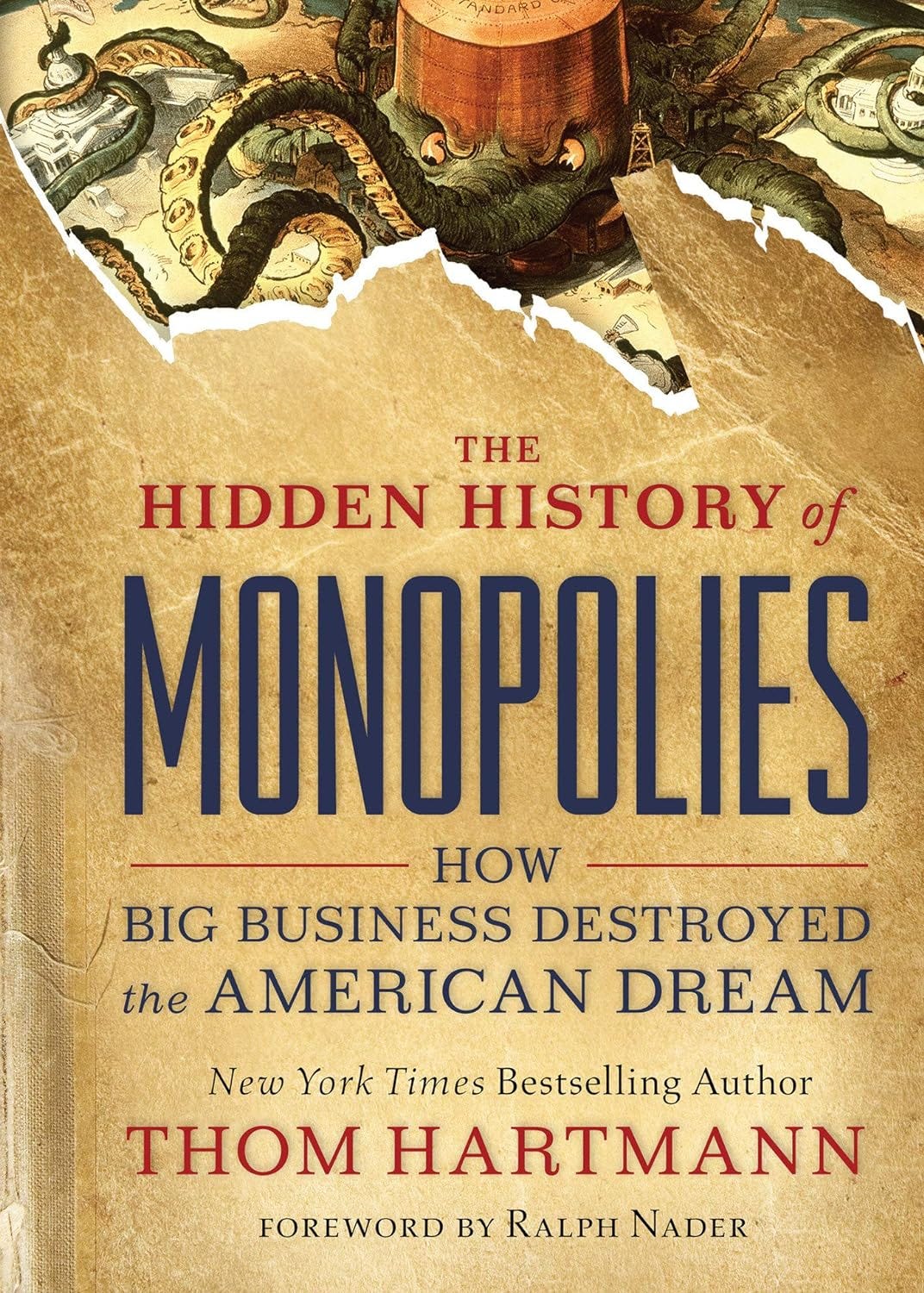Unbundling Cable, Phones, and TV
Your weekly excerpt from one of my bestselling books. This week: "The Hidden History of Monopolies: How Big Business Destroyed the American Dream"

Unbundling is the word that the multibillion-dollar industry that controls much of our news and politics, our understanding of the world and our interactions with each other, doesn’t want us to discuss. But it may well be one of the most vital words for all Americans to understand. And it’s at the core of effective challenges to monopoly, particularly with regard to tech.
Unbundling could cut your TV, phone, and internet bills from an average of around $180 collectively to around $30 or $40 a month. It would diminish the control that giant ISP corporations like Comcast and AT&T have over our ability to access information. And it would create space for competition in the telecommunications sector generally and providers of internet access particularly.
Bundling is one of the most powerful ways some of the largest and most consequential companies in America maintain their wealth and power. They maintain—and grow—their wealth in the old-fashioned way that monopolists always do—price gouging and crushing competitors. They maintain—and grow—their power over both citizens and government by deploying their money and their influencing power over media (from cable TV to the internet).
The “bundle” at the core of this is the connection between the “pipe” (the wire, cable, fiber, or 5G ability to deliver internet and cable TV service to you) and the internet, phone, and TV content itself.
There are two parts here, which in America are bundled but in much of the rest of the world are unbundled. They were unbundled here in the United States, at least with regard to the internet, as recently as the 1990s.
The two parts are the pipes and what goes through them.
When it comes to digital data—unlike water, where there’s typically only a single source—there are tens of thousands of companies around the world that provide internet flow and data to companies and consumers. In countries that have successfully unbundled their internet pipes from the data, these companies compete with each other on the basis of cost, features, and services to provide people with their internet access. The main result of that competition is lower prices for consumers.
This is why bundled internet, TV, and phone service that typically costs around $180 a month in the United States (where we bundle pipes and data) costs typically around $30 in France for the same (and often even better) service.
Since FCC Chairman and former Verizon lawyer Ajit Pai killed net neutrality in 2017, American internet service providers are now doing what Google, Facebook, and other companies have practiced: detailed monitoring of your online activity and then using and/or selling that information.
The difference between Google and Comcast (for exam- ple) is that you can choose not to use Google, or even use one of their competitors like DuckDuckGo, which explicitly does not gather, track, or record users’ information. But if Comcast is the only company with a fiber or cable coming into your house, you simply do not have the ability (short of jumping through elaborate tech hoops like getting a virtual private network, or VPN) to prevent them from seeing every website you visit, reading every username and password you enter anywhere, and consolidating and selling that information without informing you.
However, when the data going through the pipe and the pipe itself are unbundled, so that Comcast may still own and maintain the pipe into your house but you choose to get your internet services through another internet service provider (ISP) altogether, those ISP companies can connect to you through invisible and maintenance-free VPN-like protocols, and Comcast loses access to your personal information. (It would also be possible for Congress or the FCC to categorize the company that owns the pipe coming into your home as a common carrier, meaning that by law they can’t snoop on you. The Obama administration did this, but it was reversed by Trump and Pai.)
Phone companies have been regulated as common carriers since the early 20th century. This means that they must respect your privacy (just as the post office can’t open and read your mail without due process). It also means that they can’t base pricing or other decisions on what you’re discussing or with whom you’re discussing it (outside of long-distance charges).
Your phone company can’t listen in on your call and then send you a bill that says, “Because you were discussing business with your boss, we’re charging you an extra ten cents a minute.” Or, “Because you were discussing your cancer diagnosis with your doctor, you’ll be getting material in the mail from a hospital that offers excellent cancer care.”
On the other hand, your ISP can do this. They don’t yet do it as explicitly as those examples, but it already happens in a big way in the commercial sphere.
For example, when my wife was diagnosed with breast cancer a decade ago, even though she never mentioned it in any public place (or even in a private forum), she started getting ads for breast cancer therapies, breast prostheses, and chemo wigs on pretty much any computer she used when visiting ad-supported websites.
Even the big email providers are now reading every word you send and receive (so they can “improve your user experience”); it may simply be that Louise’s correspondence with her doctor or a few close relatives got sold into the breast cancer industry marketplace.
On the “who you’re talking to” front, ISPs now have the ability to (and are already engaging in the practice, some suggest) speed up sites that pay them or slow down the loading of sites either that don’t pay them or with whose politics they disagree (sites advocating net neutrality or unbundling, for example).


